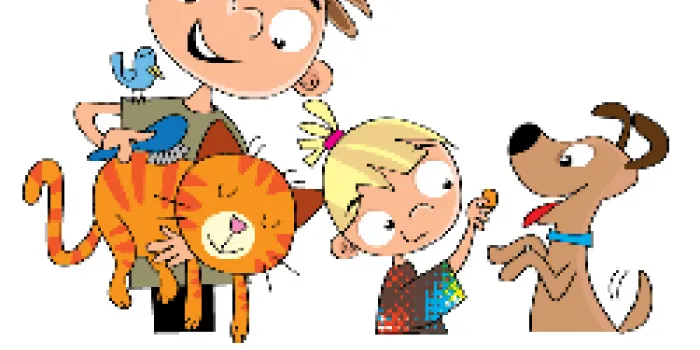Good job! Nothing compares to that look of pride on Mom’s or Dad’s face when you have worked hard and done a good job. Now, imagine your dog’s tail wag or your cat’s purring when you do something for him! Noticing your bleeds and getting your factor are a part of your life with a bleeding disorder. When you have pets, taking care of them is also part of your life.
You don’t have to do it all at once, though. Just like your bleeding disorder, how you care for Fluffy and Fido will change as you grow up.
Ages 2–3
Your little brother or sister can help with small things. Little kids can help take care of your family’s pet by giving treats, but only after Mom or Dad says it’s OK.
Ages 3–5
At this age, you can help your parents wash your arm before you get your factor medicine. And you are also old enough to wash the pet food bowls. Ask your parents if you can vacuum around the pet’s sleeping area. Soon you’ll get to hook the leash on your dog’s collar before a walk. Maybe Mom or Dad will even let you come on walks and teach you how to make Fido heel and walk without pulling.
Ages 5–10
You grab your medical supplies when you need your factor. And you can grab a brush to help your pet’s hair shine. You can help brush your dog’s teeth, too. You want to keep his breath smelling fresh and his teeth healthy. Or, find out how to change the water in your family’s fish tank. Next, act like a watchdog. Look for signs that Fido needs a walk or Fluffy needs the litter box changed. (Mom and Dad will teach you how to do this.) Exercise your cat by flicking a feather-covered wand; exercise your dog by throwing a ball or plastic disk, or taking him on a walk or run.
Ages 10–12
By the time you’re 12, you’re old enough to infuse yourself, and you’re also old enough to do almost all your pet’s care by yourself. Your parents will still be in charge of taking your pets to the vet or giving them medicine, but you can feed and groom your animals, make sure they get exercise and clean up after them.
Pets have regular needs, just like people with bleeding disorders do. You can help make sure the animals in your family stay healthy and happy for a long time. And when you see your dog wagging his tail or hear your cat purring, you’ll know you’re doing a great job.

